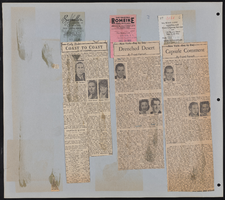Search the Special Collections and Archives Portal
Search Results

Luceanne "Lucy" Taufa oral history interview: transcript
Date
Archival Collection
Description
Oral history interview with Luceanne "Lucy" Taufa conducted by Jerwin Tiu, Cecilia Winchell, and Stefani Evans on December 16, 2022 for Reflections: the Las Vegas Asian American and Pacific Islander Oral History Project. In this interview, Taufa describes growing up on the Tongan island of Vava'u in a large family and later immigrating to the United States. She recalls her father first immigrating to Hawaii, and after obtaining a green card, her and her siblings following shortly after. While Kaufa's older siblings continued to pursue higher education and her younger siblings were too young to work, she took on a bulk of the responsibility to provide income and navigate life in Hawaii for her family. Eventually, Lucy moved to Dallas, Texas, met her husband, and moved to Las Vegas, Nevada for her husband's job. Later in the interview, she discusses joining the Culinary Union after experiencing racial discrimination at her workplace and her pride in her identity as a Tongan woman.
Text
Archie C. Grant Photograph Collection
Identifier
Abstract
The Archie C. Grant Photograph Collection (1914-1968) contains black-and-white photographs of Nevada politician Archie C. Grant. The materials include photographs of Grant with the Las Vegas Housing Authority at groundbreaking ceremonies, the University of Nevada Board of Regents, and with other Nevada politicians. Materials also contain early photographs of the University of Nevada, Las Vegas campus, including the dedication of Maude Frazier Hall.
Archival Collection
Archie and Zora Grant Papers
Identifier
Abstract
The Archie and Zora Grant Papers document the lives of Archie and Zora Grant from 1918 to 1973. Materials include scrapbooks, clippings, correspondence, records, certificates, and awards pertaining to Archie’s career in the Nevada Legislature, the State Board of Education, Las Vegas Housing Authority, and Las Vegas Chamber of Commerce.
Archival Collection
UNLV Libraries Collection of Harrah’s Entertainment Promotional Materials and Reports
Identifier
Abstract
The UNLV Libraries Collection of Harrah's Entertainment Promotional Materials and Reports includes financial reports, prospectuses, joint proxy statements, annual reports, equity research, clippings, press releases, press kits, and promotional materials for Harrah's Entertainment dating from 1962 to 2009.
Archival Collection
Las Vegas, Nevada Strip Hotel Labor Relations Collection
Identifier
Abstract
The Las Vegas, Nevada Strip Hotel Labor Relations Collection comprises legal documents, correspondence, and human resources manuals and pamphlets related to labor in the hospitality industry on the Las Vegas Strip in Nevada from 1963 to 2008. The majority of documents involve the Culinary Union, the Bartenders Union, the Teamsters Union, MGM Mirage affiliated hotel casinos, the Dunes Hotel, and the Sands Hotel and Casino.
Archival Collection
Harrah’s Entertainment, Inc. Photograph Collection
Identifier
Abstract
The Harrah’s Entertainment, Inc. Photograph Collection contains black-and-white and color photographic prints, negatives, postcards, and slides of William "Bill" Harrah at events in Nevada between approximately 1930 and 1991. Also included are views of Harrah’s Nevada properties including Harrah’s Lake Tahoe Hotel and Casino, Harrah’s Reno Hotel and Casino, and the Holiday Inn Hotel and Casino (that later became Harrah’s Las Vegas Hotel and Casino).
Archival Collection

Transcript of interview with Edward "Ed" Butera by Stefani Evans and Claytee White, July 28, 2016
Date
Archival Collection
Description
Engineer Edward "Ed" Butera spent hours constructing models from the time he was a five-year-old boy in San Jose, California. Besides his interest in building and design, the young Butera also loved math and music—specifically the clarinet, at which he excelled, and which he still enjoys. After earning his Bachelor’s degree in Electrical Engineering at San Jose State University he was hired by Ralph Joeckel as a consulting engineer for Trane, a heating and air conditioning company. Joeckel became a mentor and "second dad" to Butera after the company sent him to Las Vegas in 1972, and the two remain close to this day. In this interview, Butera shares how he engineered and designed power, water, sanitation, utilities, and heating and cooling systems on many Clark County high schools, hospitals, and data centers while considering such factors as the building's shape and its affect on the way wind forces act on its glass, windows, and doors. He talks of his casino work that began with the Stardust soon after he arrived in Las Vegas, and before his client list grew to include Tony Marnell, Steve Wynn, and MGM. Besides the hotels, he shares his experiences engineering the infrastructure for the Bellagio fountains, The Mirage volcano, Treasure Island's pirate show.
Text

Transcript of interview with Maxwell Kent "Tim" Hafen by Stefani Evans and Claytee White, September 14, 2016
Date
Archival Collection
Description
With so much emphasis put on the growth of Las Vegas and Henderson over the past thirty years, we often forget about the development of the others cities in the Valley. Expansive growth in Southern Nevada in the mid-twentieth century shows the region being one of the last bastions of agricultural existence, and Tim Hafen has been a major player in the development of the city of Pahrump. Born in St. George, Utah, and raised in Mesquite, Nevada, he graduated from Virgin Valley High School and attended Dixie College. Before the Bureau of Land Management (BLM) was called as such, his father introduced him to the working of the land through dairy and hay farming, where a young Tim decided he would never milk a cow again. His rejection of cow milking didn’t deter him from following the influence of his father after he married his wife, Eleanor, in 1951 and moved to Pahrump to become a cotton farmer. At that time, there were only 150 people in the area with a third of the population being from the Paiute tribe. Once the city was incorporated in 1964, he founded the Pahrump Valley Utility Company to get electricity to the area along with Amargosa Valley. Top crops at the time included cotton, alfalfa as well as wheat that were picked by Mexican farm laborers used under a yearlong contract with the Bracero program. vi In this interview, Hafen shares how he began his career in politics from getting called for grand jury in 1963. From 1966–1974, he was a member of the legislature, where he served two terms in the Old Capital building and held various positions such as Chairman of the State Board of Agriculture for twelve years and President of the Nevada Farm Bureau. He was speaker pro tem and Chairman of the taxation committee and decided to call it quits because of the Nixon scandal. Between 1974 and 1975 Hafen ended his political career, which he did before brothels began to come to the area later in the decade. In 1982, in the wake of the gasoline crisis, Hafen, like other Pahrump cotton farmers, could not afford to continue farming; he decided to shift from farming to development. His first development done was Cottonwoods at Hafen Ranch, which was on 160 acres of alluvial fan, non-farmable land; in 2000 he opened his second subdivision, Artesia at Hafen Ranch.
Text

Transcript of interview with Cindy Coletti and David Fordham by Stefani Evans and Claytee White, October 27, 2016
Date
Archival Collection
Description
The interior of the green house at the end of the cul-de-sac envelops the visitor. Every room exudes comfort and encourages conversation even as the lake, lapping quietly on three sides of the house, beckons. Cindy Coletti revels in this house and its interiors, all of her own design, especially because they are so different from the daring, opulent, and award-winning custom homes for which she is known. Arriving in Las Vegas in 1988 as a single mother, Cindy immediately submitted a successful design for the first Southern Nevada Street of Dreams event and began networking. She established Sun West Custom Homes in Nevada by applying the design and contracting skills she had successfully honed by building nearly seventy houses in California, Florida, and Colorado—all the while grooming her son Danny—from the time he was in his teens—to eventually take over the company. In this interview, Cindy's husband, David Fordham, shares his background, his reasons for relocating to Las Vegas, work in commercial real estate, meeting Cindy, and living at The Lakes. Cindy then recalls the experiences that brought her to Las Vegas; shaped her ideas of self-help, friendship, design, and business, and instilled in her the confidence to succeed in a man's world. Cindy has retired from building and now enjoys traveling with her husband, but Sun West Custom Homes continues to thrive under the capable ownership and leadership of Daniel S. Coletti.
Text

